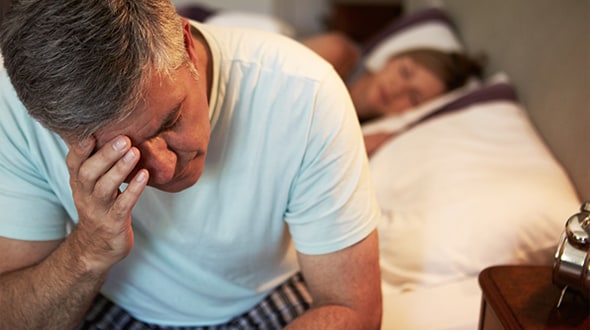4 FATIGUE FIGHTERS FOR SLEEPLESS NIGHTS
Feeling sluggish, sleepy or worn out from a bad night’s sleep? Revive your flagging energy with these instant pick-me-ups.
Fit&Well magazine
June 2015
Facing the day after a night of tossing and turning or caring for a sick child can feel like a marathon. Instead of overdosing on caffeine or other stimulants for energy try the following tactics to help you feel alert.

Hit the H2O
When you’re not well-hydrated an imbalance can occur in your electrolytes, compromising your energy levels. “Electrolytes including sodium and potassium are minerals used for important chemical reactions such as balancing the level of fluid and blood,” explains Aloysa Hourigan, Senior Nutritionist with Nutrition Australia.
“Without enough fluid, your body can’t utilise glucose and fat for energy, and your cells can’t complete the energy release cycle, leaving you fatigued.”
The antidote? Drink at least 2 litres of water every day. Add a twist of lime or lemon for taste. Or savour a peppermint tea, inhaling the fresh scent while you sip. Fatigue decreases by up to 25 per cent when people smell peppermint, according to research by the Wheeling Jesuit University in West Virginia in the United States.
Get outside
Enjoy a nature break and walk through the park or eat lunch by the ocean. Research conducted by the University of Rochester in the US shows being outside in the natural environment for just 20 minutes makes people feel more alive and energised, and improves their overall sense of wellbeing.
Or, if that’s not an option, get your heart rate going by walking up some stairs, or around your office or backyard. Research by California State University has found the more steps people take the more energetic they feel.
Improve your posture
When you’re at your desk, it’s important to avoid slouching. “When you have good posture your upper body is extended rather than collapsed and your chest cavity opens up, which can improve your intake of oxygen,” says Anna-Louise Bouvier, an author and Sydney physiotherapist whose classes help around 1,400 people each week with postural issues that lead to back pain.
“To breathe all the way down into your lower lungs, use your diaphragm. Check it’s activated by putting your hands on your lower ribs, which should move in and out when you breathe,” she advises.
Take a power nap
Snatch a siesta. Curling up for a restorative 20-minute nap at 2pm or thereabouts is just as effective for energy boosting and mental alertness as getting 90 minutes extra sleep in the morning. That’s the finding of research by Loughborough University in the UK.
Best of all, the energy boost lasts until about 7.45pm the same night. However, be careful not to nap for over 30 to 40 minutes as this can leave you feeling groggy and worse off.